
Shooting Star, Dodecatheon meadia
(*photo
credit)
January 1, 2008 Fresh Beginnings 2008
They shall beat their swords into plowshares and their spears
into pruning hooks. (Isaiah 2:4)
We all crave new beginnings and that
is why new calendar years
mean so much to us. We start again; we always hope that this year
there will be only good news and we hope that the strife and
struggles of the people in Darfur, Iraq, Palestine, Somalia and
many other places will be lessened and that true peace will arrive
this year -- and that our hopes and prayers will be fulfilled.
Let us be people of compassion. On this beginning day of 2008
peace is the shared dream of millions of people who are afraid of
what is to come. Franz Schubert's "Messenger of Love" turns us to
our distant brothers and sisters in far off lands who last night
dreamed of a new year that could bring them decent homes, full
bellies, and peace and security in their land. What a powerful
dream. The realistic craving of these people is shared with all
people of good will. A form of radical sharing is just that, an
extending of an authentic dream with people everywhere. If we all
dreamed that the least of our number were living a dignified and
high quality life, then maybe a global movement would begin to
stir. Is it unrealistic to hope that we shall all beat swords into
plowshares?
New Year's Day should consist of several components: a formal
prayer that our year will be meaningful for all; a time of rest and
pause from the busy load we often carry; and a resolution to
reflect on how we intend to improve in 2008. A few remarks about
these three elements of this day: First, how about praying with
others? We need to see that our efforts this year will be
collaborative, for we cannot do it all alone. Second, how about
making our restful day complete by relaxing in a different format
(a new book, an extra walk, a game) instead of following the usual
ritual. However, we may not be able to change the football
watchers, so don't try to pester them about it. At least try to
get them to try a more healthy snack. Third, let us make a single
resolution (multiple ones are too burdensome and more prone to
failure). Hopefully, many of us will make resolutions related to
conserving energy, and the world will be in better shape.
We start afresh with each new day, with the rise of the sun
and the first morning exercise. Starting afresh with the new year
is somewhat more dramatic. This year's "Daily Reflections" will
review those of the last leap year (2004); we find that some
updating needs to be done and each ended with a prayer.
Prayer: Oh God, Eternal Peace, make us peacemakers. We
recall the sacred Jewish traditions of physically marking a person
(Jesus) as belonging to You, our almighty Creator. We ask to make
our mark of peace today along with the one who bore him within to
Bethlehem and then to the Temple, Mary our "Theotokos." May her
transparency reach to us and transform us into bearers of the Good
News. Oh God, give us fresh beginnings dedicated to peace. Amen.
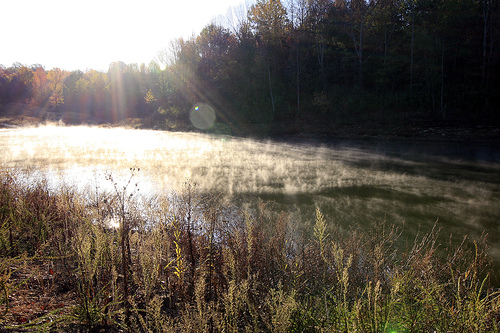
Fog rising on a chilly morn. Taylor County, Kentucky
(*photo
credit)
January 2, 2008 Ten Favorite Scripture Passages
1. The rainbow is the sign of hope for us all.
Here is the sign of the Covenant I make between you and every
living creature with you for all generations: I set my bow in the
clouds and it shall be a sign of the Covenant between me and the
earth. (Genesis 9: 12-13)
2. The practice of being unfair in use of resources is often
overlooked by the one doing it and we have to be reminded.
When there came a traveller to stay, the rich man refused to
take one of his own flock or herd to provide for the wayfarer who
had come to him. Instead he took the poor man's lamb and prepared
it for his guest. (II Samuel 12:4)
3. This motto makes us use our allotted time wisely.
Teach me to count how few days we have and so gain wisdom of
heart. (Psalm 90:12)
4. We hear the prophet giving a caution that we must tell to
a world of concentrating wealth.
Woe to those who add house to house and join field to field
until everywhere belongs to them and they are the sole inhabitants
of the land. (Isaiah 4:8)
5. We need to keep in mind the time for doing certain things.
There is a season for everything, a time for every occupation
under heaven.... (Ecclesiastes 3:1-8)
6. This passage shows God's blessing to those who seek to live
a good life of struggle.
Blessed are the poor in spirit.... (Matthew 5:3-10)
7. This is the promise that the lowly will rise.
My soul proclaims the greatness of the Lord and my spirit
exalts in God my savior; ... (Luke 2:46-55)
8. This gives the heart of the message of our nourishment
during the important work that we must perform.
This is the bread come down from heaven... (John 6:58)
9. A model of how the Global Commonwealth should be seen.
The faithful all lived together and owned everything in
common; they sold their goods and possessions and shared out the
proceeds among themselves according to what each one needed.
(Acts 2:44-45)
10. The demand to work in the public interest is given.
Always consider the other person to be better than yourself,
so that nobody thinks of his own interests first but everybody
thinks of other people's interests instead. (Philippians 2: 3-4)
Prayer: Lord, allow me to treasure these texts and to pray
over them throughout the year. Amen.

Maximilian sunflower, Helianthus maximiliani
(*photo
credit)
January 3, 2008 Keeping a Day Book
Record keepers are compulsive super organizers and yet our
effort in keeping records may be good practice -- and 2008 is the
time to begin. If a resolution has not yet been made and you do
not make one, consider keeping a "day book." My great uncle, Louis
Burke, a master gardener, kept standard red record books for sixty
years and these are now regarded by his descendants as of immense
value. I was able to read one and it proved to be a window into
his very full life.
A day book does not have to be a diary, which involves the
thoughts and feelings of a given day, though these can be quite
important for the introspective; diaries are important for those
who seek to grow spiritually in a methodical fashion -- and the
record may be of interest to a chance reader later after the writer
passes. Rather, my preference is for the "day book," a record of
all the significant things for each day. Even the interpretation
of significance changes with time. Note: Day books are not meant
for everyone, for some may find keeping up burdensome or overly
disciplined. The secret is not getting behind.
We certainly cannot remember numbers from day to day and so
the records of the "day" book are for those of us with short
memories. I do consult past ones numerous times for a variety of
reasons. I keep the following numbers in my current day book:
* major assignments of the day (talks, work on writings,
editing corrections, major travel record with miles, meetings
attended (though I keep them few if possible), garden planting and
major harvests, and time and place of liturgies;
* approximate time at each assignment and the number of hours
expended along with the total hours of work each day;
* crossed out planned assignments that did not occur, for this
could prove important as to cancellation reasons;
* person for whom day and liturgy is offered;
* weather conditions, major storms and temperature range each
day;
* letters sent to named individuals;
* e-mails sent or responded to;
* phone calls to, from and for people;
* marketing activities that include the prices paid for
groceries, supplies and other items along with mail purchases;
* sacraments administered;
* Books, periodicals or other major literature read that day;
* the strokes I make on the rowing machine along with the
distance I walk each day; and
* major reflections or change of direction in life (rare
except during annual retreat which I record in the day book).
Prayer: Oh, master record-keeper, you know and remember all.
I tend to forget and so this humble record of the day is what I can
do best. Make each day more meaningful and allow me to recall at
the end of the day the good things that were accomplished. Amen.
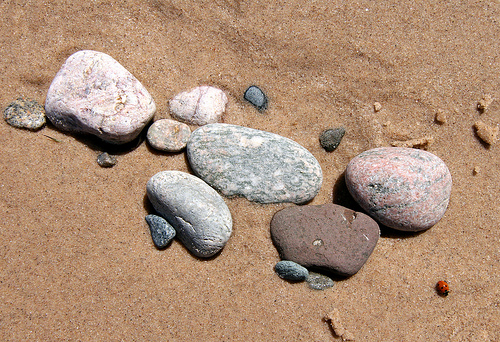
An array of stones, many colors
(*photo
credit)
January 4, 2008 God is our Rock of Refuge
A rock is a symbol of security; it does not normally crumble
or erode very quickly. A photo of Little Devil's Den at Gettysburg
taken in 1863 shows the boulder with the cracks and indentations as
the one we can see first hand over 144 years later. We know that
granite rocks turn to soil with time; but that is after an
extremely long period. For all intents and purposes such rocks are
considered stable, secure, firm and unmoved. Thus God as our
security is seen as "rock of the ages," our anchor, our stepping
stone, our point of refuge.
The rock is our base of operation. Jesus tells us to build a
house on the rock and not on an insecure sandy foundation. What is
interesting is that we see God as the rock and us as the building
on the rock for ultimate security. We depend on God and we must
work at our salvation. The two go together and are not separate:
God working and we working together with God. We have to build a
household that is secure. Our parents were once called by God to
build such a home and act as rock together so that we might find
stability during our youthful period of life. Single parents must
perform the task alone and we pray they can do so. In still other
cases of death of parents a third group or the children themselves
must construct such a house, a rock of refuge.
An African missionary tells about an impressive team of home-
makers in South Africa on a continent currently with 12 million
orphans. Twin orphans, Daniel and Danielle, were hardly in their
teens and yet they were called to be head of a household on the
death of their parents by AIDS. Their father died first and then
their widowed mother followed, with them promising to hold the
family together. This they did with lessons taught them patiently
by their parents just before their final sickness and death.
First, the two were freed of the painful task of going long
distances for firewood, which was the only source of heating water
and cooking for the poor. Instead, they used solar energy by means
of solar cookers to do two things: to cook their simple meals each
day and to heat and purify their own local drinking water. The two
twins continued the family garden because their parents had taught
them when to plant the root crops, which could thrive on their soil
and would supplement the handouts of flour/soy mix and oil by the
local relief agency. They dried leaves of certain trees and plants
and ground them up and added them to the soup as a protein
supplement. And all the while they prayed in a total fashion to
the family rock and to "give us this day our daily bread." Daniel
and Danielle taught the missionary a valuable lesson: they could
hold the family together through selfless work and cooperation.
They took turns going to school in the evening and teaching the
three young ones at home school periods doing the day. They were
an exceptional little family and true models.
Prayer: Lord, teach us through the example of those who are
examples of what can be done to save our troubled Earth. May they
have the courage to continue in their earnest efforts. Amen.
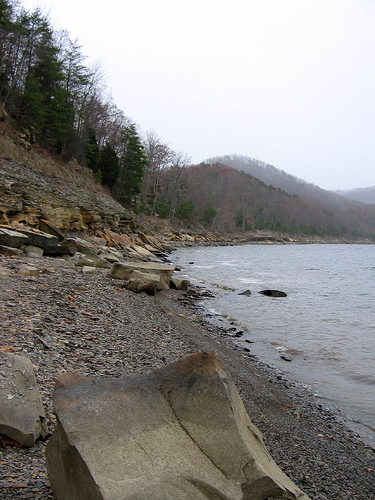
Snow squalls at Cave Run Lake, near Morehead, KY
(*photo
credit)
January 5, 2008 AIDS Epidemic Update
AIDS is still a major epidemic, which has taken the lives of
about twenty-five million people in the last twenty-seven years
since it was first recognized as a serious medical problem. The
recent drop in the number of AIDS-related cases (by six million,
and half of these in India) is regarded as an accounting adjustment
and certainly not as an indication that the epidemic is
disappearing. If millions were erased from the rolls in one
stroke, does this mean that other accounting errors could be in the
opposite direction, for the impulse is always to undercount, not
overcount? Currently the great majority of cases are in Sub-
Saharan Africa, but the epidemic is spreading to many other parts
of the world as well.
Medical research is finding a vaccine treatment still elusive
and the current treatment with drugs quite difficult due to the
nature of the disease. The cocktail of medicines retards the
original infection or the spread of this devastating disease by
arresting the deterioration of the body's defenses. As in other
epidemics, the onus is often placed on the victims who are often
regarded with contempt and abandoned as are also their orphaned
offspring -- who number over twelve million in Africa alone.
In a world of insensitivity, this epidemic is a wake-up call
for compassion, which literally means suffering with others. The
call is to refrain from judging victims, to make efforts to support
AIDS sufferers, to promote generic treatment for the poor (the
majority still go untreated), and to support campaigns to prevent
and educate through such programs as the highly publicized and
seemingly successful abstinence campaign in Uganda. Some prefer to
turn this education campaign into a safe sex crusade, the results
of which are being hotly debated at this moment; some saying it is
the only solution and others that it is playing Russian roulette
with human lives. Since body fluid contact is the normal conduit
of AIDS, all the more opprobrium has been rendered to those who
have transmitted or received AIDS through sexual contact or use of
drug paraphernalia. Furthermore, fear of spread through accidental
contact results in the victim being treated like lepers of old and
often ostracized and forced to live in almost inhuman conditions
for the remainder of their often shortened lives.
AIDS will not disappear soon but its effect could be reduced.
If international trade and travel would virtually cease, the speed
of AIDS' spread would most likely decline. A pessimistic fatalist
says that world population stress gives rise to AIDS and this is a
natural form of population control -- a horrible thought. Others
on the other extreme say that with proper and plentiful condom
dissemination and knowledge, the epidemic would be controlled.
That's hardly consolation for current AIDS sufferers and survivors.
Prayer: O Master Healer, teach us your compassion and allow
us to extend it to AIDS sufferers throughout the world. Make all
people show that compassion to victims and their relatives. Amen.
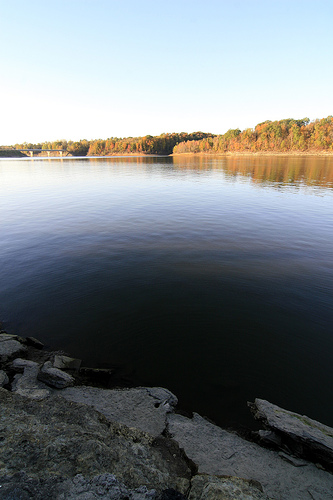
Barren River Lake in winter
(*photo
credit)
January 6, 2008 Epiphany: A New Insight
Let the mountains and hills bring a message of peace for the
people. (Psalm 72:3)
Today, Americans celebrate "little Christmas," while many
parts of the world regard today as the major Christmas feast.
Christ, the Good News, comes to an eagerly waiting world. Just as
the Matthew account tells how the wise men brought precious gifts
to lay at the feet of Jesus, so we bear our unique gifts on our
risky journey of faith to the destination up ahead.
We are meant to be the wise bearers of this age. Our journey
is not limited but takes us consciously to all suffering people in
the farthest reaches of the globe. Our spiritual gifts are brought
from the dawn of each in some part of the world -- in far off
Oceania and then to India and then Africa and eastern, middle and
western Europe; last of all we Americans arise and offer gifts.
Our vehicle is not a camel but the Internet that can take us on
this journey throughout our Earth. We come seeking to care for
Earth herself, for it is the one fragile living space we have in
the vastness of empty space -- a blue green speck in a sea of void.
We each bring our own precious gifts to the altar of God and,
though small in amount, we bring them with a generous heart. We
travel lightly on this Earth for we are born naked and will die
with nothing to carry away but our love. We are like the little
drummer boy playing his drum before the crib. We too are called to
give with a loving selfless heart, not seeking to embellish with
pretensions or materialistic ambitions. We want to help save our
wounded Earth and this hope is what we bring with all our
willingness to help where needed.
To take a journey of faith is what it is, namely, a journey
and not a trip, a tour, an excursion, a hike, a sight-seeing
venture, a travel bout, or a movement about. Our journey is more
than what these convey. A journey means a day's work "Diurnata"
from the Latin "diurnum" or daily portion. Former journeying by
our ancestors coming to these shores involved great risk --
uncertainty of lodging, food or security. Like Magi, subject to
deliberate misdirections, we are all deceived by empty promises.
Our goal is to reach the Lord. It is the holy name of Jesus
pronounced by those who came before with such reverence that we
seek to follow. In his name all will conquer. We find that name
out there in among the trees of North America on which the early
martyrs carved the name "Jesu." We find it in our hearts and the
hearts of other people who we serve in some manner.
Prayer (alternative opening for Epiphany): Father of light,
unchanging God, today you reveal the resplendent fact of the Word
made flesh. Your light is strong, your love is near; draw us
beyond the limits this world imposes, to the life where your Spirit
makes all life complete. Amen.
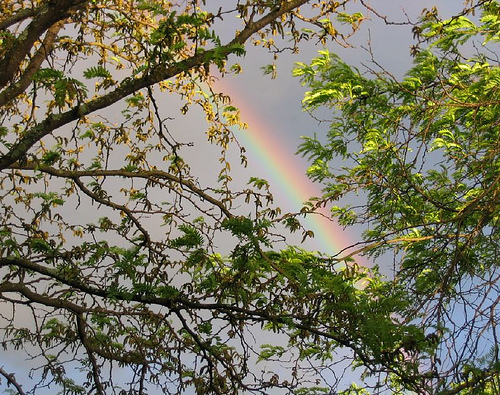
A glimpse of spring's return
(*photo
credit)
January 7, 2008 Facing Reality through Annual Health Checkups
Every time we visit the hospital or a sick friend we ought
to thank God for the gift of our health -- and to resolve to
do all we can to protect that gift. One of the ways to show care
for ourselves and our loved ones is to have an annual checkup (my
doctor recommends twice a year). Stewardship of our body involves
both seeing how short our life is and realizing how much we ought
to take care of this fragile condition. Care and concern require
a spirituality of knowing that we are vulnerable and dependent upon
the Giver of life for each day given. Furthermore we have to face
reality and the examination often brings this out quite well.
The internal physical checkup is like a health confession --
what we did wrong or right for the last year. The vital signs of
life -- stress, skin color, good and bad cholesterol, blood
pressure, and weight. As we get older the drama actually
increases with each checkup. Is something amiss? We feel
somewhat relieved when we are assured that no new difficulty has
surfaced, or we are struck when told to get further testing in
areas we never dreamed about on coming to the medical center. We
have a way of denying health problems or any need for further
diagnosis. Human life is never uninteresting and health is a major
human concern throughout the world. Of course, many avoid the
annual checkup because they fear the worst or they do not like all
that probing about -- or, even worse yet, because they have no
health insurance and simply can not afford to get sick.
We speak of health checkups (in the plural) because portions
are not covered by individual internal medical specialists. Do we
get the annual dentistry checkups as well? Some omit the teeth
checkup because many health insurance policies do not cover dental
health. Do we have regular eye checkups? We do need optimum eye
conditions for driving, reading and close work. And finally do we
have a checkup for hearing? Here I knock on wood -- but can
hardly hear it.
The final suggested checkup does not require other experts but
is a personal practice-review of living in which we are the expert.
It is our own annual preventative health and wellness audit -- and
is free of charge. Let's hope we can answer all the following in
the affirmative:
* Do I get regular exercise even on bad winter days?
* Do I take no drugs except what are prescribed and even here
insist that they are really needed?
* Do I refrain from smoking? From drinking anything more than
moderate amounts in company and at meals?
* Do I get proper amounts of sleep and rest?
* Am I careful about eating habits and do I eat healthy food?
* Do I drive according to the rules?
Prayer: Giver of Life and all Good Gifts: We thank you for
letting us live so long in these times. By living longer, we have
more opportunities to thank you and be of service to you. Amen.

Red-spotted newt (Notophthalmus v. viridescens)
(*photo
credit)
January 8, 2008 Annual Retreat and Physical Environment
In the morning, long before dawn, he got up and left the
house, and went off to a lonely place and prayed there. (Mark 1:35)
Now is a good time to find free time to give to the Lord
during our busy year. The need for such a period is more pressing
than most of us admit -- and many omit this in an effort to spend
more time with their families. However one could think of a joint
and multiple retreat to include those you miss being with on a
frequent basis. Some of us do succeed in taking reflection time
for eight days or a weekend or even a special day. Whatever the
length of time, give the physical environment some added
consideration.
* Is the retreat site accessible from where you live? Long
distance travel to a retreat location may be the only way you can
really get away but, on the other hand, some local places may be
okay if your do not tell your location to those who may intrude on
the retreat. Of course, travel is always important but is not the
only consideration. Some like to get away from auto accessibility
and pack in the supplies by backpack to a remote place. More power
to you!
* Is the place simple? The retreat house or cabin or rustic
outdoor location should be inviting, clean and still quite austere
or somewhat simple, although the interpretation of "somewhat
simple" will vary with the needs of each retreatant. Some cannot
climb steps or sleep in a loft or need ample windows and fresh air.
Some desire a motel setting while others find this plainly
distracting. Some like prepared meals while others want to fast at
times and keep to their own menu and simple fare.
* Is it prayerful? Choose a retreat location that is
relatively quiet and, if possible, also scenic. The environment
lends to our ability to turn our minds and hearts to God. Under
normal circumstances people prefer external tranquility, though
some can make due with a "silence of the heart." Generally silence
holds precedence over scenic view and is possible even near
congested areas when sites are enhanced by vegetative, wooden or
masonry noise barriers, or are protected by topography that
deflects the sound. Is the place a location where one can enjoy
the woods? Sunrises and/or sunsets? Lakes? Wildlife?
* Is it secluded? Solitude seekers like seclusion but not
isolation. If the retreat center or cabin is in a well-chosen
enclosed natural space (a cove, valley, dense woods, etc.),
seclusion is the major factor. Some may prefer "relative"
seclusion, that is, security through cell phones, companions, pets
or even security guards; often these connecting links add comfort
to reflection time. An alternative is a non-secluded lodging but
excursions into secluded areas during the day.
Prayer: Lord, teach us to give quality time to prayer. Amen.
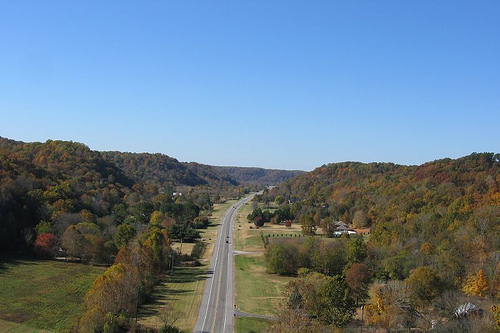
Overlooking a rural highway in central Tennessee
(*photo
credit)
January 9, 2008 Air Travel for the Privileged
The following is not a theoretical question. I am trying to
figure out whether I should attend a meeting in June that is
scheduled at a great distance but, as one trying to save resources,
I should perhaps not attend. Therefore I ask myself the following:
Is the trip necessary? So much can be handled by letter,
email, phone and even conference call to different places. The
logistics should make it better to gather at local places and use
teleconferencing instead of long distance travel of large numbers
of people. All too often I travel because I think something,
someone else or myself is a necessity to the meeting. Too often
there is pretending involved -- pretending to work, for it takes
effort to travel; pretending to be doing other than vacation; or
pretending to allow others to think it is important that I attend.
However, travel is expensive to Earth and bank account.
Can one delegate take the trip and report back to the rest?
A local meeting of people on a given subject will make the one
selected to travel familiar with all participants, their problems,
questions and contributions.
Is air travel becoming so disconcerting that I am in a bad
mood when I get there? The answer to this is an honest "yes," and
it means that I am not the ideal person to represent the others.
With each passing year, I am less able to put up with the hustle
and bustle of getting from transfer points, checking or carrying or
storing bags on the plane, being searched and still not spilling or
losing something, tolerating the food, or half running for
connections, or the next fellow with the cell phone, or the one who
uses your restricted air space by leaning back the seat in front,
or being caught in a stalled plane for hours, or the cold you pick
up on the way. Leave the planes for others.
Am I one of the privileged? Less than ten percent of the
world's people are privileged to travel more than once by air. It
is a privilege that the more affluent can afford because of the
cheap fuel that exists in limited supply here and now. As the
petroleum supply (70% now used for transportation) becomes more
limited, fuel prices will rise and flying will likely become more
restricted. Jetting to conferences may be a thing of the past.
Question a traveler can ask are "Whom is the traveling for?" "Me
or those I serve?" Is the fuel use counted against me or others?
Can that fuel be available in a decade or are we privileged
to undertake the trip and thus deny future essential needs?
Jetting is a practice that simply may not continue in the late
twenty first century, but whether it will end is hard to verify.
Prayer: Source of Wisdom, teach me to discern the important
things of life. Show me when I am needed or when I pretend that I
am needed. Help me decide if others are more able to take my place
and whether I ought to insist on another meeting format. Amen.

American chesnut (Castanea dentata)
(*photo
credit)
January 10, 2008 The American Chestnut Is coming Back
They also grew behind my house, and one large tree, which
almost overshadowed it, was, when in flower, a bouquet which
scented the whole neighborhood, but the squirrels and the jays got
the most of its fruit; the last coming in flocks early in the
morning and picking the nuts out of the burs before they fell.
Henry David Thoreau, Walden, (1854).
The sad history of the terrible blight of the Castanea
dentata or "American chestnut" is told in many ways and places.
My own history is that of a mighty tree that had only its massive
trunk standing while I grew up, for it had died just before my
birth. The tree stood at the border between our place and Uncle
Pete's, and though both he and my father were neat farmers, they
allowed the branches of the mighty tree, now dead, to stay put as
litter. Chestnut is slow to rot. We brought a piece of the gray
wood to the tobacco stripping room once and my dad said to take it
back, as though we were grave robbers. The mighty tree had meant
so much to them. Even my maternal grandfather spoke of getting the
cows near that giant tree when he was a boy. Sadly, neither I nor
amy of my siblings ever took a picture of it.
In 1904, a fungus disease, Cryphonectria (formerly Endothia)
parasitica, believed to have been imported on Asian chestnuts in
the 1880s, reached the New York Botanical Gardens. For the next
half century it slowly progressed across the eastern United States,
killing millions of the region's grandest trees. Few American
chestnuts remain though there are survivors, some only a few miles
from my residence here. The Chmiels, who are the owners, have
shared their American chestnut crop with me though they have to
compete with hungry squirrels. Most of the dead trees have had
sprouts that died before reaching maturity.
Early efforts to develop a blight-resistant strain of pure
American chestnut failed and were all but abandoned by mid-
twentieth century. However researchers found a weaker form of
chestnut blight fungus which consists of a virus which is
transmitted to virulent strains under certain conditions and allows
the trees to survive (hypovirulence). A second method is
backcrossing American and Chinese chestnut hybrids to breed for
resistant chestnuts and by this process developing a forest from
trees with blight resistance. A third method is obtaining
resistant chestnuts by transferring to them resistant genes.
Several national groups work on this effort: the American Chestnut
Foundation, American Chestnut Cooperators' Foundation and the
American Chestnut Regeneration Effort as well as regional groups.
Interest is growing again not only in producing seedlings from the
rare survivors but also in planting new stands of chestnuts (at
least two trees near for cross pollination). Restoration comes.
Prayer: Lord God, giver of new life, help us to promote a new
beginning of the American chestnut, so that a tree that has been
harmed will return to our landscape to beautify this Earth. Amen.

Harebell, Campanula rotundifolia
(*photo
credit)
January 11, 2008 Launching the Growing Year: Hot Beds
We marvel at the ingenuity of those who came before us in
how they were able to make things work. Composting is one of those
areas, and the genius of earlier gardeners was that they combined
the heat produced by composted materials with sprouting and growing
early seedlings for the spring. These gardeners knew that
greenhouses were possible but required great care and expensive
fuel to create artificial environments to grow seedlings in winter.
However, they knew that the floors of animal barns, with the manure
covered with fresh straw bedding, would stay reasonably warm
throughout the cold winter nights. By conserving composting heat,
they could sprout seeds much quicker than spring sun-warmed seeds.
Gardening with a hot bed perhaps has at least a thousand year
practical application in the temperate zones of Europe, and the
practice can even be traced to antiquity. It means putting
composting manure on the sides and bottom of a bed of soil. When
I was young on our family farm, we constructed the hot beds by
spreading a layer of partly composted cow or horse manure about
six-inches deep on bare ground and adding several inches of top
soil. A series of eight-foot long two-by-twelve-inch portable
wooden frames was set on the manure bed yielding contiguous four by
eight-foot beds. These were banked with a plentiful supply of
manure up to the level of the slightly inclined frame windows. The
vegetable seed was sown in soil that was surrounded by warm
composting manure. Our hot bed equipment consisted of single-pane
windows, but we know that double-pane ones do a more efficient job
by conserving heat at night. On warm days the windows were placed
ajar for air flow and the escape of excess moisture and heat. Some
plant watering was required.
My great uncle, Louis Burke, (mentioned on January 3rd) was a
highly successful gardener with a medium-sized farm operation just
outside Lexington, Kentucky. He wrote on January 2, 1922 that he
and his helpers made fourteen hot beds using horse manure from
nearby horse farms. He certainly had a plentiful supply of manure,
as it was generally regarded as a troublesome waste. He knew
that the heat of the bed did the work of starting the plants
(cabbage, broccoli, sweet potatoes, tomatoes, peppers and others),
which would then be ready for spring planting. Gardeners who lack
access to horse manure can use cow manure though undiluted chicken
manure is too hot and will burn seedling roots. Layering with
insulation below the hot bed could permit the use of a thinner
layer of manure. Double-pane windows will conserve more of the
compost-generated heat, which is augmented by heat captured by
insolation on sunny winter days. Applying straw bales near the
perimeter would permit a thinner siding of composting materials as
well. Overly composted materials would not generate sufficient
heat. Hot-bed manure is later used as garden fertilizer.
Prayer: Lord, teach us to follow the examples of expert
gardeners and heal our wounded Earth through good organic practices
that will yield chemical-free homegrown produce. Amen.

Closeup of katydid on trail map
(*photo
credit)
January 12, 2008 Free or Fair World Trade?
World trade would seem to be grouped with such universally
acceptable concepts as motherhood and apple pie, but should not a
distinction be made? Free trade seemed to be the buzz word during
much of the twentieth century, when the removal of tariffs and
duties meant a sure recipe for growth in the global economy.
Certainly access to goods from other places is a good goal provided
we strive to furnish the basic bulk items (food, water, building
materials and fuel) from sources closer to home. That can require
both ecological (transport expenditures) and security (closer to
home) considerations.
Essential conditions of co-equal trading parties are not
always met for authentic and just free trade demands fair trade
conditions. Pope Paul VI cautioned decades ago that unequal
trading partners may not be equally free to negotiate together; the
weaker ones would be at the mercy of those with more power. The
establishment of equality comes first, or else the free
interactions will be a mere sham. How could the poor farmers in a
small country compete in any meaningful manner with a multinational
corporation with immense holdings and attempt to dictate conditions
for the so-called free market?
The World Trade Organization (WTO) is caught in the middle of
this gross inequality. Spokespersons from the developing countries
such as Guatemalan Nobel Peace Prize winner Rigoberta Menchu have
called for fair trade and a proper climate for international
agreements and negotiations. At various WTO meetings in the past
decade, demonstrators have appeared and expressed their misgivings
about some of these international trade agreements that favor
richer nations with their ability to dictate the terms to poorer
ones. The skepticism has become an open revolt and has led the
original advocates to free trade to say, "Hold a moment. Are the
conditions fair especially when wealthier nations can subsidize
some of the commodities such as cotton that are being traded in
competition with unsubsidized cotton from poorer African nations?
The same pattern holds for a number of industrial commodities.
Fair global trade calls for a new look in the light of
multinational corporations and subsidies. Many Americans drink
coffee and are even willing to pay high prices for it at Starbucks.
Yet we know that fluctuating coffee bean prices hurt small growers
who work long days and hardly have enough return to buy bread for
their families. Besides advocating herbal drink substitutes, we
could acknowledge coffee drinking and help promote cooperative
systems where small farmers can obtain a living wage with a minimum
price for their beans. Thus we affirm truly fair world trade, not
trade that benefits corporate profit-makers. Fair trade items are
appearing in many alternative shops and should be encouraged.
Prayer: O God who wants us to share with each other, teach us
to trade in such a way that justice comes to all partners and that
each of us watches out that fairness reigns supreme. Amen.

The mourning dove, a sign of hope
(*photo
credit)
January 13, 2008 Baptism and Life-giving Water
I formed you and set you as a covenant of the people.
(Isaiah 42: 1-7)
Isaiah speaks of the Servant of Yahweh, and that voice of so
long before was applied to Jesus and his public manifestation
or the second Epiphany or manifestation of the Christ. Jesus is
committed to a life of bringing about change in the people,
upsetting an established order, announcing justice for all the
people, being a light to the nations, and a liberator of captives.
In a very real sense, this is a call to abandon the old order and
to take on a new one. It is time for someone to ignite a fire, and
Jesus' baptism is the initial event.
Peter comes to a realization about his own ministry as a
continuation of the ministry of Jesus, now being further extended
to all God-fearing nations and peoples. God shows no partiality,
for whoever fears God and acts uprightly is acceptable to the
Almighty. During this month of vocation we return again to our
original calling, our moment of listening to God and being willing
to set out on our journey of faith. Peter is being called again to
look more deeply into his own ways of seeing things and
understanding his own service in the light of Jesus's call to
ministry when the Spirit came down upon him in the form of a dove
and the voice came from the clouds giving a divine stamp of
approval. Peter speaks in the name of all of us in the Church in
saying that our mission is linked to that of the profound call of
Jesus Christ to begin a process of liberation of the entire world.
Peter advances in awareness as part of this liberating process,
and we with all believers say "Amen" to this.
The divine voice from heaven is one of approval, "This is my
beloved Son. My favor rests on him." Jesus goes into the
wilderness to be baptized by John, and thus the wilderness is the
place for radical change and profound insight to bring justice to
the world amid much opposition.
Jesus, prepares as priest, prophet and king for his call to
public ministry. We enter the spiritual wilderness to associate
ourselves with him, to be led by the Spirit as well as to obtain
insight into what we are to do as we face a threatened planet and
an Earth riddled through with injustice and division into the haves
and the have-nots. Our brothers and sisters must be treated with
kindness; they need proper pay, necessary health benefits,
accessible schooling. Prisoners need to be liberated, terror to be
replaced by hope, and all to have adequate food and decent housing.
This means we live our baptismal mandate to bring about a
reestablishment of the commons where all share in the resources of
this world as equals.
Prayer: Oh God, your spirit was seen as a dove, revealing
Jesus as your servant and anointing him with joy as the Christ to
bring to the poor the Good News of salvation. Help us to carry the
same Good News to the poor in every land. Amen.
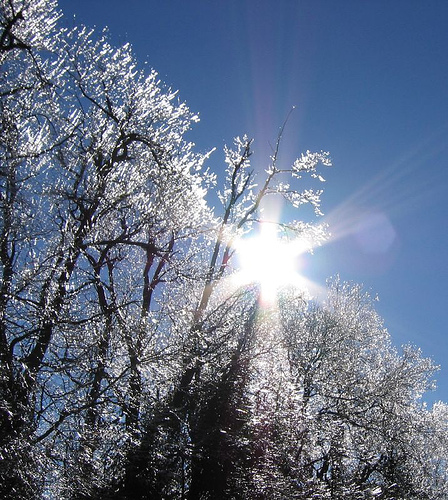
An ice storm in Kentucky, trees burdened with ice
(*photo
credit)
January 14, 2008 Snow Storms and Global Warming
Winter is the season of uncertainty and thus we need to trust
in God and use our common sense. Both take effort and foresight.
Stay at home more in winter. Keep the place stocked with a
couple weeks supply of food and enough water and fuel to make it
through a severe storm. Some keep candles, batteries for a radio
and even a kerosene heater in case of a sleet storm. The best
overall advice is to hunker down and rest indoors with plenty of
liquids and Vitamin C. With age and greater difficulty in battling
snow and ice, the option of staying at home takes on new meaning.
Many older folks simply shouldn't go out on the road on snowy days.
Work in teams (relatives and neighbors) so that mobility can be
maximized. A buddy system can be useful.
Travel only when necessary. Snow storms have a way of changing
the list of necessities. The "having to go" is a relative matter,
with those with less common sense more inclined to take unnecessary
risks in order to fulfill supposed obligations. The degree of
necessity is generally found within a vast array of cancellations
affecting most of the local community activities. Sometimes the
services are offered for the few most accessible, and many of us
fit in the gray area of partial concern and partial incapacity.
My late cousin, Margie Schumacher, told of the immense snow storm
at Good Samaritan Hospital in Cincinnati in the 1970s, when she and
her fellow dietitian, blood sister Rose, with one other were faced
with feeding five hundred patients for breakfast and lunch before
other help could arrive. It was a nightmare that she remembered.
Travel well prepared. In case we must brave the snowy
elements we should have a car with plenty of gasoline and a good
heater. For longer trips a sleeping bag, change of clothes and
flashlight are helpful. Also, for a trip that involves walking, a
small backpack should have some basic food for quick energy, some
essential personal items and a good book to idle away the waiting
time. Always wear enough clothing, with heavier than usual long
underwear, proper gloves, cap and boots. What mama told us to do
when we were young kids still applies: keep warm and dry. If we
are in good physical condition we can weather the storm well.
Keep in good spirits. If it is possible in snowy weather, keep
a sense of humor and accept the fact that winter is always winter
and the unexpected just can happen. I get somewhat dismayed every
time snow enters a very tight schedule and forces public
transportation cancellation or road closures. We blame event
planners, and placing blame adds to the stress. But there is no
one to blame but myself for getting to the point of always
expecting reasonable weather for the many activities I undertake.
Prayer: O Spirit of light, guide us always when we are so
uncertain about what lies immediately ahead. Be our safeguard and
warmth as we venture to help others in troubled times. Help us to
seek the light and trust that spring is soon to come. Amen.

Seeking nourishment.
(*photo
credit)
January 15, 2008 Soup for Winter
Our thoughts in January often turn to soup and there are
several reasons for this:
Soup is warm and welcoming -- Granted, cold soups are for
helping us endure summer's heat, but it is the steaming soups on
cold winter days that more perfectly hit the mark, as those winter
hikers and outdoor workers well know. We often need quick energy,
and a cup of soup will do just that whether doing hard tasks or
easy ones on winter days.
Soup is easy to make -- Whether we like to cook or not, we
often do not have an infinite amount of cooking time. Soup is easy
to fix and we can hardly ever go wrong with an infinite variety of
possible ingredients and flavorings. Experience allows the busy
person to choose from that rich variety in a matter of seconds, if
not minutes. The soup preparation can be performed in a solar food
cooker even in winter. The easiest way to make soup is to cook
things together -- refrigerated soup mix or left overs or some
greens, root vegetables or brassicas left in the garden.
Soups are creative -- Like snow flakes, no two soups have
exactly the same taste. The variety of vegetable combinations for
a twelve-ingredient soup are abundant. I once calculated that from
the vegetables I ordinarily grow each year there could be different
twelve-ingredient soups for every day of the year, though a few
ingredients may have to be purchased or brought in from the storage
place during winter months. Adding spices in various combinations
furnishes a special zing and a variety of flavors to routine diets.
Soup is nutritious -- If not overcooked, most soup will retain
the vitamins and nutrients in the basic ingredients. We generally
retain water in which we cook the vegetables as part of the soup
stock and thus make the soup in a single pot. Keep salt levels low
and remember that commercial soups are loaded with salt; excess
salt can be avoided by using non-salted puree rather than purchased
broth as a basic ingredient. Good soup helps the constitution;
the stomach is at peace after we have lived like kings at
breakfast, princes at lunch and paupers at supper. Soup can help
us watch our weight even as an evening meal.
Soup is international -- Actually many cultures have soups
with their own particular flavors and ingredients. One may add the
curry or the chili or the oregano or heaven knows what and think of
a foreign land while preparing this culinary creation. January's
cold and darkness needs something to raise our spirits and the soup
spice may be the key. A serving of soup will help us overcome the
seasonal blahs and the bite of winter's long months.
Prayer: Lord, keep us soup makers happy for you form us into
an informal union of those who cultivate hope in this non-growing
portion of the year. Soup is the nourishment that keeps our hope
alive so we can come through Lent to the glory of Easter. Amen.

Pinesap, Monotropa hypopithys
(*photo
credit)
January 16, 2008 Promote Religious Freedom Day
We often take our religious freedom for granted and forget how
fragile it is. All freedom can erode over time without vigilant
oversight. The early founders of our nation valued freedom highly
in their long march to an expanding liberation (through freeing
slaves, allowing women to vote and Native Americans to become
citizens and welcoming migrants to our shores). The liberation
process is still incomplete but is progressing by fits and starts.
The Bill of Rights guarantees the basic freedom to worship God as
one sees fit along with freedom of the press and expression.
In Kentucky some religious intolerance has occurred but the
memory has faded with time. A political group called Know Nothings
rioted in the 1850s and killed Catholics in Louisville through fear
of the increasing numbers of German and Irish immigrants at that
time. At various times in America Jewish people have seen their
houses of worship smeared with paint and their tombstones
desecrated. Small groups of sectarians have been driven out of one
town or another and their churches burnt down. In fact, the
religious practice of snake handling is forbidden in our and
neighboring states for the sake of safety. And on and on. One
could say the basic thrust is towards greater religious tolerance,
but that trend is not totally predictable. State religions
prevailed in the former colonies and some groups were not allowed
to worship in one or other place. Thus, under the umbrella of
patriotism, repression could easily occur. Today, some seek to
persecute or highly restrict Moslems due to the current Middle East
conflicts.
A great effort is being made by American secularists and some
liberal elements to force hospitals that are sponsored by religious
institutions to perform abortions or to engage in practices that
they find contrary to their religious beliefs. The ones who desire
restriction say that if the hospitals get tax exemptions and
subsidies in any manner, they must carry out this or that activity.
Other groups must conform to objectionable practices under the
guise of tolerance. The power of the predominant culture to
propagandize the general public is very real, and this power is
growing with the concentration of media in the hands of fewer and
fewer groups. Health institutions are not the only area impeded.
Religious restrictions arise in regard to social services, criminal
justice, education and most other areas. Do news outlets sometimes
designate religious institutions as somewhat unpatriotic for
deviating from "acceptable" public standards? Upholding the rights
of parents to raise their children as they see best may become more
difficult if restrictions continue. Government attempts at
religious-based social initiatives are testing grounds for
religious freedom.
Prayer: Lord we thank you that we can give this prayer in
public, that we are able to speak on religious issues, that we can
worship in peace, and that our freedoms can be guaranteed. Amen.

A young pup, dashing across the landscape
(*photo
credit)
January 17, 2008 The Pluses and Minuses of Wood Heat
Happy Ben Franklin Day (born 1706)! We associate this man
of broad interests with everything from post offices to hundred
dollar bills, from free libraries to the Declaration of
Independence, from newspapers to wood heating. It is the last that
we will feature this year, for wood is a renewable fuel, just as is
solar and wind energy, and to some degree it has been thought of as
an earth-friendly secondary heat source. However burning wood adds
carbon dioxide that causes global warming, and has lost its luster.
Wood users feel secure when domestic heating could be
threatened with sleet causing connections to public utilities to
falter and fail. Wood-burning gives a sense of coziness, for "home
is where the hearth is located." Wood-burning enhances a basic
human instinct, that is, to be mesmerized by fire that began when
our pre-historic ancestors discovered and controlled fire for the
first time. The sight of wood smoke curling in the winter valley
or the smell of wood smoke has been cherished, but those good
sights and smells give rise to more recent signs of air pollution
coming from burning organic matter. Fireplaces are terribly
inefficient and can be net heat losers taking out more heated air
than they produce and only warming some standing right by the fire.
Thanks in part to Franklin, metal inserts have been installed
in modern fireplaces where allowed by building regulations.
Fireplaces gain in efficiency when they contain built-in air
convection ducts. Franklin never got a patent for his stove, for
he was convinced that it belonged to all the people. He was ahead
of his times and was respected for his practical knowledge, wit,
and far-sightedness on a host of political, economic and social
issues. The iron cast (Franklin) stove or modified open fireplace
that bears his name showed the basic concepts of heat transfer at
work for us. He is really the "father of energy conservation."
Many older wood stoves do not meet federal government emission
standards; more recently, they have been seen as sources of air
pollution due to incomplete combustion. They emit wood smoke that
gives off harmful carbon monoxide, particulate matter and tars. In
the course of time, as new more efficient and certified stoves have
become available, especially those built after the mandated date of
July 1, 1992, far less polluting wood stoves have been operated.
The mandated wood stoves are all fitted with secondary combustion/
(oxidation) surfaces. Some of these are equipped with catalytic
combustors, which burn particulate matter and other gases before a
possible escape up the chimney. However, care must be taken for
the catalysts need to be replaced every few years, and they can be
poisoned easily by burning non-wood materials such as plastic.
For more information on clean burning wood stoves and fireplaces go
to <http://www.epa.gov/woodstoves/technical.html>
Prayer: Lord of comfort and warmth, allow us to learn to heat
the home to true warmth and to dispel the cold of hard hearts.
Help us care for those hurt by rising fuel costs. Amen.

Common garter snake, Thamnophis sirtalis
(*photo
credit)
January 18, 2008 Unity Octave at One Hundred Years
Today begins an eight day (octave) period of prayer for unity
of all Christians that will end on the feast of St, Paul's
Conversion on January 25th. This celebration was started one
hundred years ago this month by Rev. Paul Wattson, originally the
leader of an Anglican Franciscan community. Today the ministry is
carried on by the Catholic Franciscan Friars of the Atonement with
headquarters at Garrison, New York.
The major Christian religious families are all committed to
the coming together of the separated churches and groups into a
unity of witness and cooperative endeavor. These regard it as a
public commitment that "ecumenism" grows, namely, the promoting of
worldwide Christian cooperation, understanding, and eventual unity.
This policy of prayers for unity is now becoming rather main stream
and has resulted in a host of joint endeavors, study and working
groups at the theological level and joint social justice programs
and support groups. In recent years the joint study group of
Catholics and Lutherans developed a joint statement dealing with
the faith and works controversy leading up to the Reformation, and
the Methodists have signed on to this as well.
What about a possible "ecumenism" or further unified action by
people concerned about the environment? The difficulty with such
unified action is that many secularized people see no future beyond
their own lifestyle; likewise some "religious" people see no
future earthly concern beyond their own mortal life -- for they are
heaven bound. These people, whether secular or "religious," are
concerned that the environment endures during their years but they
are without a distant hope, a long-term future for this Earth.
Unfortunately, some of these people would like to use the resources
up now since reality is only the span of their own lives, and how
else to enjoy things but in the present moment?
When some individual or group holds that another's ultimate
goals are impossible, then there is little ground for unified
action. Today many who hold to an unsustainable lifestyle have no
faith in the future. To attempt to hold a unified action with
those who waste resources would be a sham and would only lead to
the acceleration of the current destruction of Mother Earth
herself. Such an "ecumenism" is not possible. The secularized
view of life is sort of shared by some who profess to have
religious other worldly beliefs. We cannot be party to unity talks
with groups bent on the destruction of life through unsustainable
means or who have no regard for the environment as such. It would
do us well to distinguish between those with whom we pursue unity
talks and those with whom such efforts are of no avail. It would
be like celebrating hard liquor with alcoholics.
Prayer: Holy One, help us to know the power of unified action
in our lives, to encourage others to do the same, and to reject any
efforts with those who are bent on the destruction of this Earth.
Help all of us change our ways and live sustainably. Amen.

Violet wood sorrel, Oxalis violacea
(*photo
credit)
CONGRATULATIONS ON THE ELECTION OF THE
NEW SUPERIOR OF THE JESUITS ---
FATHER ALDOLFO NICOLAS OF JAPAN.
January 19, 2008 Cell Phone Use and Silent Space
Cell phones are now being used by the hundreds of millions in
all parts of the world. They are becoming fashionable and
affordable for large numbers of people -- and are being constantly
used to keep in close contact with loved ones. Many people no
longer have in-house stationary phones and have grown to depend on
the cell phone. Such massive numbers of cell phones reduce costs
to where even lower-income people in Africa and China now have
these devices, and the latest nation where the practice has
accelerated is India, since China is now saturated after its 2003-4
shirt. The cell phone connects people with people and enhances
community interchange in ways not previously possible or even
dreamed about. Cell phones are people-friendly and can be operated
easily by the great majority of average consumers. Since
apparently no major polluting emission results from cell phone use,
it is also considered Earth friendly, for towers replace telephone
lines that took many wire and poles and required the removal of
trees along cleared land routes.
Cell phones have additional benefits. Cell phones can furnish
valuable information at a low price to large numbers of individuals
who otherwise would be isolated and without immediate access to
phones. Traveling relatives are in contact even at times of
emergency with the assurances of safety greatly allaying the fears
of people who care about them. Cell phones can be used for
scanning the whereabouts of individuals especially youth; they can
save travel by asking a more convenient person to fetch a product
or run an errand. For persons afraid of certain places, the cell
phone becomes a companion because someone else can be asked for
help in time of emergency and threat.
Nothing is perfect and so cell phones also have limitations.
They are just small enough to get lost or stolen. Some people
believe that they must always act as though they are very busy, and
thus talk urgently to someone while eating or driving, even when in
the company of others. The distractions and dangers of using cell
phones while driving are recognized, and several states and regions
are banning their use while driving. Can the overuse of cell
phones lead to compulsive behavior, that is, the need to talk with
others at all times, and the diminishment and destruction of silent
space and time for reflection? Are not conversations often
interrupted by cell phone ringing, and does not an added burden
result when cell phone holders regard any message as more urgent
than the current conversation? In public places the self-
importance and loud voice of the cell phone talker in the next seat
become a form of noise pollution. Does excessive use cause
physical harm to heavy and constant cell phone users? Although
cell phone coverage is increasing, cell phones still cannot be used
in certain mountainous areas due to the shadows created by terrain.
Prayer: Lord, cell phone users remind us of the need to stay
connected to you. Give us the courage to ask others whether they
stay in contact with you as much as with relatives. Amen.

Stonecrop, Sedum ternatum
(*photo
credit)
January 20, 2008 Vocational Call in the Twenty-First Century
I will make you the light of the nations so that my salvation
will reach to the ends of the Earth. (Isaiah 49:6)
In the silence created by a heavy snow fall, when all sounds
normally heard are dampened, we strain to hear any sound at all.
In winter silence we await a call from God, a call that comes to
all of us, not just those young or at important periods in life.
Each of us listens to our unique calls, as different as the
snowflakes from others' calls to ministry and change of lifestyle.
When asking about a new job or ministry, friends will say,
"Are you happy?" There are many reasons for being unhappy in this
modern world, but we accept that things are challenging and that
God gives us the opportunity to live today in a world of troubles.
God's call is to us in this age -- not another -- and we need to
rest in the privilege of that calling. According to one survey
Nigerians are regarded as the happiest people in the world; they
trust in God and what God gives them in life. Are you happy? In
her final years my mother always said she was happy, happy. She
was content with what God had given her to do -- and God was near.
Through baptism all Christians have a priestly, prophetic and
kingly role to play, a call to holiness and service. I knew at
ordination that things were to be tough and different. My parents
did not want a formal first Mass, so I didn't have one; second, at
ordination a pigeon spurt on my alb as I was walking into church --
and asking the Spirit to speak. The high priestly call that had a
sense of "princely" character was so different from what our first
American bishop (John Carryall) wanted to be known as "Mr. Bishop,"
similar to George Washington being called "Mr. President." The
suggestion evaporated and within a half century bishops mandated
six white horses at time of visitation (never really implemented.
Our priesthood is now undergoing a purgation and we are distancing
ourselves from being "princely."
We gradually become aware that God calls us to let go of the
things of the past and to come ever closer to those within the
divine family. God is constantly calling. I heard Father Hubbard,
the Glacier Priest and scientist, when I was young, and I
considered that it would be nice to be a geologist/priest.
However, Xavier University did not have a geology department, and
I ended up majoring in chemistry, but still seeking God in the
natural world with all its splendor. We regret our failures, but
know that a forgiven past becomes the key to a better future. Life
is a continual listening too and refining our original calling.
Prayer: Oh God, Source of all calls, we place our trust in
you. If noise crowds out the listening, allow to flee from the
noise and listen all the more intensely. Help us to find moments
and places of silence so we can hear what you intend for us to do
and to be. Help our leaders to encourage those with authentic
calls to respond generously. Amen.
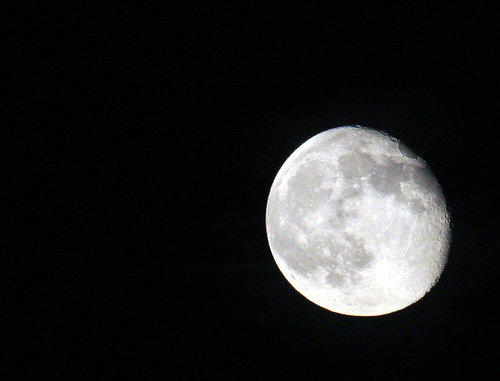
(Almost) Full Moon
(*photo
credit)
January 21, 2008 Africans: Joys and Sorrows
How can the second largest land mass on Earth (Africa) go
overlooked? In part, it is because of its distance from our
shores. It is of less economic importance than our trading
partners in Asia and Europe and thus perceived as not needed for
our security and well-being. It is not like Europe and the Middle
East in being the origin of our more prosperous citizens. Africa
has been regarded as the dark continent, a play of rain forests and
wildlife and the unfortunate people who were enslaved before being
brought under horrible conditions to America's shore centuries ago.
Also the problems of Africans are so formidable that we prefer to
look the other way.
We are reminded by television, jet travel and Internet that we
cannot avoid Africa and Afro-Americans. The world is too small and
so their problems become ours, for we are sisters and brothers. We
often take Africans and their resources for granted, playing one
country off against another to obtain the lowest prices, to the
detriment of the African workers. Besides the problem of AIDS as
mentioned earlier this month, a host of tropical diseases plagues
Africans more than others, even though drug companies spend
billions on pain killers and diet drugs for the wealthy class
elsewhere. Africa is besieged with millions of orphans and
millions of refugees as tribal wars continue unabated.
As we celebrate Martin Luther King's birthday today we
redouble our efforts to address both African and Afro-American
problems. Some would say that a color blindness is in order and
that keeping racial statistics is outdated. However, Head-Start
cutbacks have affected Afro-Americans more than other groups.
Affirmative action programs, which are needed to correct the
accumulated injustices of hundreds of years, are being challenged
and discarded by people who think they have unfairly been left out
due to being white. True, Afro-Americans have made great economic
and political strides, but education- and health-wise much more has
to be done. A higher proportion of blacks has diabetes, AIDS and
heart disease. On an average black males die a decade earlier than
their white counterparts. Furthermore, large number of black
Americans are incarcerated; more of those males between the ages of
19 and 39 are behind bars than were enslaved from that age group at
the start of the Civil War; and, these prisoners work at near
slave wages for prison industries, often profit-making enterprises.
Africans and Afro-Americans have been so very gracious and
forgiving. Few of us realize that crews on slave ships were often
dumped at the ports where the slaves were being sold, and that the
slaves in their less sorry condition befriended these abandoned
sailors; this was a real testimony to a godly people.
Prayer: Lord, teach us to love and find ever deeper
friendship among our African and Afro-American sisters and
brothers. Make us learners of the compassion they have brought to
our land -- and help us all to express that compassion for others.
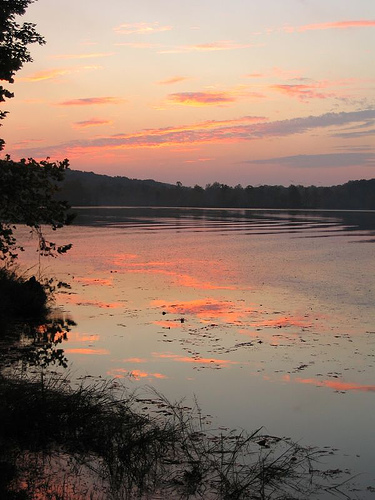
Sunset at Energy Lake, Western Kentucky
(*photo
credit)
January 22, 2008 Corporations Exist at the People's Pleasure
Few of us regard the corporate institutional structure of our
society as threatening our democracy. However corporate wealth and
power can do just that, erode our democratic values and promote
profit-making at all costs including our sensitivity to others.
Some but certainly not all corporate CEOs and other officers have
been in the forefront of white collar crime that seeps out from the
board rooms and suites of business America. But even more
remarkable than such revelations is the power of individual
corporations in our globalized world, which exceeds that of entire
nations. Where did our courts ever conceive of the idea that
corporations are persons? The Program on Corporations, Law and
Democracy <www.poclad.org> has developed a model legal brief to
eliminate corporate rights:
Summary of Argument. "The people of these United States
created local, state and federal governments to protect, secure,
and preserve the people's inalienable rights, including their
rights to life, liberty, and the pursuit of happiness. It is
axiomatic that the U.S. people -- the source of all governing
authority in this nation -- created governments also to secure the
people's inalienable right that the many should govern, not the
few. That guarantee -- of a republican form of government --
provides the foundation for securing people's other inalienable
rights and vindicates the actions of people and communities seeking
to secure those rights.
Corporations are created by state governments through the
chartering process. As such, corporations are subordinate, public
entities that cannot usurp the authority that the sovereign people
have delegated to the three branches of government. Corporations
thus lack the authority to deny people's inalienable rights,
including their right to a republican form of government, and
public officials lack the authority to empower corporations to deny
those rights.
Over the past 150 years, the Judiciary has "found"
corporations within the people's documents that establish a frame
of governance for this nation, including the U.S. Constitution. In
doing so, Courts have illegitimately bestowed upon corporations
immense constitutional powers of the 14th, 1st, 4th and 5th
Amendments, and the expansive powers afforded by the Contracts and
Commerce Clauses. Wielding those constitutional rights and
freedoms, corporations regularly and illegitimately deny the people
their inalienable rights, including their most fundamental right to
a republican form of government. Such denials are beyond the
authority of the corporation to exercise ...[and] the Courts or any
other branches of government to confer."
Such asserted constitutional claims should be dismissed because
they deny the people's rights to life and liberty, and their
fundamental right to self-governance.
Prayer: O Jesus, who drove out those who had turned your
father's house into a den of thieves, teach us to reclaim the
commons from those with excessive corporate power. Amen.
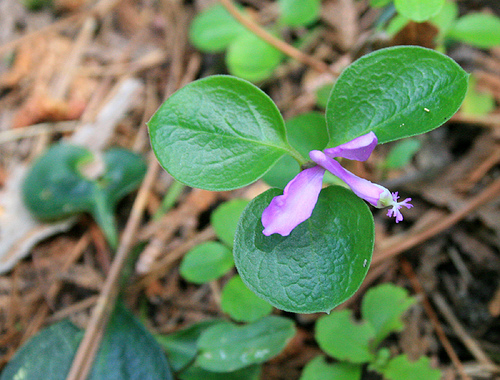
Fringed polygala, Polygala paucifolia
(*photo
credit)
January 23, 2008 Legible Handwriting So Others Can Read
Happy Handwriting Day! Few human art expressions are as
beautiful as a good flowing script that is being lost today by too
much computer work. We marvel at those who take the time to write
with a penmanship taught many years ago and now performed with care
and pride. Before the age of typewriters and word processors the
art of handwriting was highly prized, for it was the medium of
written communication, and the neater the better. In this age of
haste and breathless activity we have come to regard the nearly
illegible scribble of the doctor's prescription (several cases
exist of this having fatal consequences due to misreading by
pharmacists), as the sign of modern handwriting conducted with
speed and dispatch.
Handwriting has suffered from that lack of importance and
effort given to manifesting how well one has mastered the pen. In
a pre-fountain pen age it required the skill of dipping a straight
pen into an ink well and writing with only as much fluid at the pen
point or the sharpened feather could bear. We forget how much
effort it took to write, and that the page was blotted to keep the
excess ink from smudging a document. Philip the Second, King of
Spain and of more of the rest of the world than almost any other
ruler in history, spent a late night session of handwriting when
manuscripts to be sent by departing ship to his viceroys were
smudged and needed rewriting in his own hand. We've come a long
way baby! However, in the process our handwriting has
deteriorated -- and we acknowledge this with almost perverse pride.
So often, the handwriting is highly legible because we have
taken pains to rewrite a set of notes; thus improving the final
draft through corrections and omissions of defects. A better
allotment of white space helps in the rewriting. On the other
hand, few of us regard white space as important until we see
someone write along the borders and in fine small script; then it
becomes a major puzzle to decipher the text and we postpone
rereading it until some indefinite future date. By rewriting and
tightening the text we ease the pain of reading otherwise illegible
handwriting. Often we forget that good penmanship was an art
practiced with pride and care prior to the printing press.
I find my own handwriting hard to read. What about others
reading it? We tend to make cryptic and abbreviated notes to save
time, and thus make life more difficult for a possible future
reader. Often we write so that we can quickly retrieve if
necessary, but some care is a good insurance policy. Maybe having
a day to remember and value good penmanship helps. It is an art
and gives satisfaction to the writer as well as makes the person
appreciated later. Furthermore good penmanship is enjoyable.
Prayer: Jesus, you are recorded as having written but once
and that in sand. Somehow the readers understood. Teach us to
write in such a manner that the text is no chore to read and yet
deliver the messages for the benefit of all intended readers. Amen.

Bright caterpillar, making a way up the tree
(*photo
credit)
January 24, 2008 Ways to Radically Share
We are called to share the resources of this limited and
fragile Earth with each other, and this requires a radical sharing.
Radical sharing means going to the root of things and finding in a
deep motivation of love the reason why all are to be respected and
no one is to be without resources. This desire to share so that
all live in a dignified manner means that resources will have to be
redistributed, a fact that is somewhat difficult to effect. To
share means that each must give up: those with resources must give
up what does not really belong to them; those without resources
must not exact the takings through emotionally driven revenge.
Thus a third way must be found to share what some have in
superabundance and others desperately lack as essentials for life.
The authentic root of sharing is love; the tapping of the root
is through a process involving the participation of all people of
good will. Vengeance must be avoided at all costs, if the sharing
is to be genuine for no loving person wants to provoke a vengeful
act on another. Some will say that giving up their "possessions"
will hurt. If, in fact, they are not your possessions but belong
to more then the giver, the act is one of liberation and ultimate
salvation for the current holder of the resources. Thus while
painful at first, the liberating act ultimately brings well-being
to those of good will. Radical sharing is ultimately a win-win
situation.
In recognizing our individual or group lacks, our
powerlessness to make essential change on a fragmented level, we
tend to find a hidden spiritual power that comes through sharing.
Alone we are weak; together we are strong; the greater the
togetherness, the greater the strength. With regard to the takers,
the ones who take what belongs to all may be as much at fault as
the one who does not let go. If you are to be perfect do not force
the giver to part with his possessions by some forceful means, but
rather after setting down the grounds of discomfort, allow the
option of cooperative action so that the rich and poor alike can
give and receive in one single act, powerless before the prompting
of the Spirit. Only if refused must more forceful steps be taken -
- that still does not demand violence to the person. The risk of
allowing the other to participate is a sharing in the ultimately
powerless condition needed for authentic change.
God shared and always risks much for us. Jesus was born in a
stable subject to hunger and thirst and terrorist threats from a
dictator, was a refugee and then grew up in hill country with a
different accent. Then the establishment, plotted against him and
ultimately killed him. The risk was immense so that God's power
could be revealed. We too suffer much in compassion with the Lord.
We too become vulnerable in becoming a little poorer like Jesus.
Prayer: Lord teach us to radically share who we are and what
we have so others may have what it takes to live a higher quality
of life. Amen.
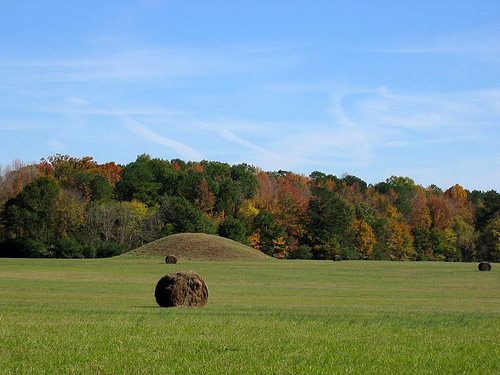
Pharr Mounds, near Tupelo, MS
(*photo
credit)
January 25, 2008 The Internet: Free Travel of the Word
On this feast of St. Paul we ought to see the potential of the
Internet for communicating the Good News. Certainly anyone using
a personal computer and the Internet confirms the educational,
energy-saving and global informational sharing advantages of the
valuable twenty-first century tool. Manual typewriters are things
of the past. Word processing reduces editing time, and allows for
information storage and rapid shift and correction of the text. A
host of writers have come to depend on these devices called
"computers," and a fairly global, democratic, inexpensive and still
vulnerable system called the Internet. They do prove to be suitable
and appropriate technologies but not without some negatives
aspects.
Benefits. Models of computers have proved to be the "last
word" for a limited time and then must be discarded for something
which is the current last word -- truly planned obsolescence.
Generally speaking, computers are widely accessible now to those
with only an elementary degree of training. In so-called
developing countries, a computer installed in a village can be used
by a wide number of savvy individuals with basic education; and the
Internet is accessible all hours of day and night. This window to
the outside informational world allows users to by-pass dominant
overlords who would otherwise dictate the input of information
(though some repressive governments limit Internet access). The
Internet is likewise becoming a place to sound international alarm,
solicit needed political funding, open discussion, and bring about
the overthrow of oppressive regimes.
Limitations. A few years ago a book, Silicon Snake Oil,
discussed a number of problems with excessive computer dependence
or misuse. Many of these notes of caution have proved true for
what is appropriate can also become inappropriate through misuse.
The fragile nature of sophisticated modern technologies is always
before us. When these technologies are interconnected, the
vulnerability is compounded. A national electric grid is complex
and vulnerable; a computerized electric grid is doubly vulnerable;
individual homes linked through an electric grid and equipped with
net metering procedures are more vulnerable than an independent
domestic solar system. Hackers or budding terrorists continue to
slip in Internet viruses, which can reach into the individual home
or business and create havoc. Safeguards need to be discovered,
installed, maintained and updated. Some regard this as making the
personal computer less people-friendly than originally intended.
Let's take steps against the sophisticated hacker through proven
virus protection and firewalls and keeping the Internet outlet
disconnected when not in use. Out of prudence I have two
computers, one for word processing and one for the Internet -- and
I keep duplicate files in a distant place for safe keeping.
Prayers: Lord, show us that the Internet is a tool for social
justice; it is the equivalent of the Roman road system as a means
to spread the Good News to others. Help us see it as such. Amen.
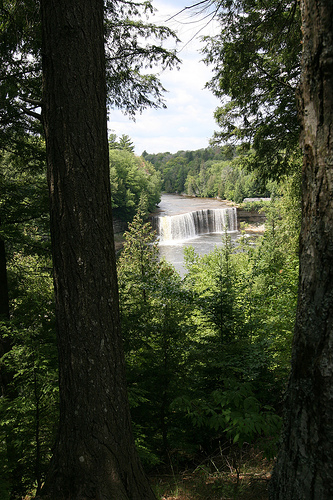
Tahquamenon Falls, a view through the forest
(*photo
credit)
January 26, 2008 An Examination of Conscience
Wellness begins in knowing ourselves for what we are. It is
truly personal auditing and should be exercised frequently.
1. Do I love God with my whole heart, soul, mind and strength?
Do I talk to God daily in prayer? Do I love my neighbor as myself,
and have no unforgiven enemies? Do I remove myself from material
idols of every sort? Do I share possessions with those in need?
2. Do I respect the name of God in my speech? Do I object
when others use God's name in vain?
3. Do I worship with others on the Lord's Day? Do I rest and
relax this one day of the week? Do I refrain from purchasing un-
necessary items so others can rest as well on Sunday?
4. Do I honor my parents or those in authority? Honor my
spouse? Do I respect Mother Earth and all her creatures? Do I
honor our traditions and our holy mother the Church?
5. Do I make an effort not to hurt people through abusive
words, quarrels and fighting? Do I abstain from overeating or
excessive consumption of drugs or alcohol? Do I strive to be a
peace-maker as opposed to creating dissention in the community? Do
I confront others who hurt animals in any way?
6. Do I show respect for the person of my neighbor in all
forms of looking, gesturing and touching? Do I show respect for
myself as well in all matters? Do I make an effort not to watch
movies or tv where sex or violence is a major theme?
7. Do I know and show a sense of justice as to what belongs
to others? Do I know what is enough and not excessive? Do I see
that my excesses and luxuries may even be taken from the resources
of future generations? Do I refrain from doing damage to others'
property through carelessness or spite?
8. Do I always stand on my word no matter at what cost? Do
I remove myself from gossip or idle talk? Do I avoid attending
events I do not believe in (weddings, civic events) and thus not
bear false witness? Do I show compassion for weak human beings?
9. Do I overcome the temptation to linger and desire others'
looks, shape or other bodily gifts? Do I distance myself from past
pleasures that are truly past and should remain that way?
10. Do I overcome the desire for a bigger boat or car, or
house or view of the lake? Are these not idols, which I could
allow to block out my attention to the Lord and service for others.
Prayer: Lord, help me to see my faith as your gift, which I
must enhance, share and profess. Let each day be a way for me to
make this faith journey more meaningful. Amen.

Scolopendromorph (centipede), curled upon a log
(*photo
credit)
January 27, 2008 Urgency and Reform
Reform your lives! The kingdom of heaven is at hand.
(Matthew 4:17)
The imperative to reform our lives sounds to us at first
reading like Chicken Little telling us the sky is falling. On
second reading we find here an urgency that Christ preached at the
beginning of his ministry, and that the urgency is still with us in
just as great a degree. It is not just the sky; it is our wounded
Earth that is threatened and the creatures who live on it. Never
before in history has a people been capable of and moving to the
destruction of the planet itself. Now we are and a larger number
of people are taking notice. In fact, global warming was the prime
environmental topic of 2007, and may even be again this year for
good reason. We have already reflected on this subject a number of
times over the past four years.
Having said all of this, I am more and more convinced that
this is not the full condition of urgency. Nor is the
proliferation of nuclear materials, no matter how urgently that
point is made. Nor is the concentration of wealth in the hands of
a few privileged individuals, corporations and national agencies
though this is truly a major problem on which I am writing a book.
Nor is the underlying class divide between the few rich and many
poor, and the terror that prevails through the eyes of all who
watch their kids die from lack of proper food and medicine.
What is THE urgency? It is the lack of reform. And who for
heavens sake wants to preach reform in this age of secular
sophistication? A gimmick called renewable energy or efficient
vehicles is not sufficient. Honestly, none of these unreformed
affluent will do much more than pause in their onward march to
planetary destruction. We have a generation of up and coming
Chinese, Indian, Russian and Latin Americans who want to equal us
and surpass our affluent ways. What are the Chinese stats showing:
one new coal-fired powerplant a week, and that is not all?
Americans and Europeans ought to lead the way, and yet lifestyle
changes is low on their agenda as well.
We must move in the direction of self-denial, of simple
living, of a conservation ethic. And this cannot be done by paying
others to conserve while some continue to jet about the world
calling for profound changes by others. A distant conference is
not the way to talk about world needs. This can be handled by
teleconferencing and the Internet. We cannot expect others to
change their food preferences from resource intensive meat products
without all being motivated to do so by eating other quality foods.
Reform must be universal and with no exceptions. Reform will have
to be dictated and contain effective regulations, for we cannot
expect voluntary choice to save our wounded Earth.
Prayer: Lord, give us the honesty to see what must be done and
the courage to start the process, for the time is short. Amen.
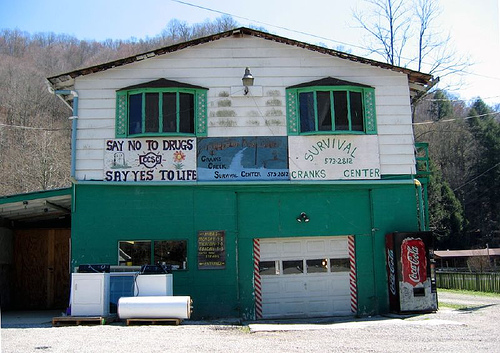
Cranks Creek Survival Center, Harlan County, KY
(*photo
credit)
January 28, 2008 Simple Lifestyle 2008
Our 2008 "99 Ways to a Simple Lifestyle" include:
1. Nine fuel use patterns: go renewable energy and battle
non-renewables; choose solar applications; promote wind energy;
install micro-hydropower; burn wood and biofuels sparingly;
explore geothermal potential; turn off air conditioners and use
fans; create comfort zones and modular heating; regulate humidity.
2. Nine conservative ways: save water; consider compost
toilets; light house efficiently; dry clothes outdoors; make,
repair and reuse simple furniture; recycle, maintain and repair
buildings; reduce domestic space; use green building design and
materials; eliminate unnecessary appliances.
3. Nine land use practices: improve land and introduce edible
landscaping; remove invasive species; mulch garden; select native
plants; grow organic produce; compost kitchen/yard wastes;
extend growing seasons); plant fruit trees; start a wildscape.
4. Nine travel hints: choose efficient vehicles; maintain
them well; car-pool; combine trips and walk more; use public means;
drive conservatively; vacation near home; bike safely;
consider a solar electric car.
5. Nine household tips: budget resources wisely and save;
use simple household cleaners; keep home chemical free; avoid
aerosol sprays; insist on quiet zones; decorate home simply; keep
no firearms/hazards; cut hot water costs; maintain houseplants.
6. Nine food ways: support and eat locally grown food; lower
salt, refined sugar, fatty foods; make soup, bake bread, create
beverages; refrained from processed foods; lower meat consumption;
preserve food and use no food additives; harvest wild foods;
advocate breast feeding; conserve cooking energy.
7. Nine simple personal habits: get needed rest and sleep;
eat and drink moderately; purchase quality fabrics and clothing;
use simple personal items; protect from weather extremes; avoid
substance abuse and excessive medication; get annual physical, eye
and teeth checkups; consider simple funerals; refuse credit cards.
8. Nine forms of green recreation: enjoy participatory
sports; hike, walk, bike or jog; acquire a hobby, art or craft;
make clothing and decorations; exercise daily in or outdoors;
create non-competitive toys and games; camp and backpack; be
creative and write or tell stories; read more, watch tv less.
9. Nine personal growth ideas: plan/perform daily personal
audits; make annual retreat; fast and pray; worship with others;
sing, play and enjoy music; be compassionate to strangers; utilize
Internet wisely; teach literacy; visit the sick and bury the dead.
10. Nine civic/community duties: know legislators and
candidates and vote wisely; fight environmental pollution; support
recycling center and sorting; ban non-returnables and disposable
products; lobby for legislation; demand universal health insurance;
protect drinking water; demand shared resources and fair taxes;
help create work opportunities.
11. Nine wildlife & animal suggestions: develop a bird
sanctuary; keep bees; protect wildlife; use no furs; care for
pets; consider aquaculture; observe and celebrate wildlife;
control overpopulating deer, wild geese and turkeys; reintroduce
native species.
Prayer: God, teach us to see all life as a simple gift.

Chilled buckeye blossoms, early bloom caught by snow
(*photo
credit)
January 29, 2008 Heifer International
Today Heifer is recognized around the world for its effective
approach to ending poverty. Because of Heifer hundreds of
thousands of families are able to feed their children and give them
a better future. Heifer provides much more than food. You bring
hope and triumph of the human spirit.
President Bill Clinton
The project that we feature for January is one that I have
been acquainted with for years. We helped place animals donated
through Heifer International (Heifer) to poor folks in Appalachia.
Also two of us videotaped the Heifer model farm in Arkansas eight
year ago. Heifer works with families and communities in the United
States and in foreign countries to end hunger and poverty while
caring for our planet.
Since 1944 Heifer has helped 8.5 million families or the
equivalent of 45 million men, women and children in more than 125
countries move toward greater self-reliance through the gift of
livestock and training in environmentally sound agriculture. The
impact of each initial gift is multiplied as recipients agree to
"pass on the gift" by giving one or more of their animal's
offspring, or the equivalent, to another in need.
In 2007, Heifer assisted 140,000 families through gifts of
animals and training to take care of them and passing on the gift.
Members from an additional 200,000 families received special
training in sustainable farming techniques. In Cambodia, a project
called "Food Security for Repatriating Khmer Rouge" provides
sustainable alternatives to former enemies who once knew only
violence. In Rwanda, a small-scale dairy farming project provides
outlets for sharing opportunities for lasting peace and community
building. In Kosovo, the goal in three villages is to rebuild farm
shelters, increase milk production and increase family income
through microcredit loans and the distribution of 140 dairy cattle
to 100 farm families. In Guatemala, 134 struggling families in
three communities are provided with goats, rabbits and hens to
improve nutrition and promote sustainable agricultural practices.
Contact: Heifer International
P.O. Box 1692
Merrifield, VA 22116-1692
For donations phone (800) 422-0755
or donate online <www.heifer.org/catalog>

Ahhh.... An old dog gets scratched under the chin
(*photo
credit)
January 30, 2008 Respect Animals Especially Pets
We learn from the wise and the spiritually astute that we must
respect animal life. The value of pets is often overlooked,
perhaps because some give them extraordinary treatment such as
choice food, surgical operations and formal funerals, much of which
is denied our poorer brothers in sisters in some countries. In
fact, a sizeable portion of grocery shelves is taken up with pet
food -- not "feed." Why such extravagance when so many people
need essentials? Of all attitudes that changed in my ecological
journey, dealing with pets made the biggest jump, even though I am
still concerned about bird kills by domestic cats.
Some say God gave us pets because we need them for our own
health and well being. We expend many resource to heat schools and
buy textbooks and travel to and fro for fun, and see doctors.
However pets can be low-cost teachers, can furnish entertainment,
be good for psychic health, and prove to be protectors as well.
They are totally loyal when others abandon us; dogs focus on their
friends (let us not say masters), listen to them, lick their face
when dejected, and protect them to the point of death. They give
themselves without reserve. The roles played by more sensitive
pets are far more than we would imagine at first. Pets know needs
often far faster that the rest of us; they stay with an injured
person until help arrives, or in some cases go get help. God gives
us pets for our own good. Granted, they are different for they
have unique personalities, which develop along with our own.
Pets seek to endear themselves to us in many ways. They will
drag a rotten road kill and lay it on the porch, causing the
housekeeper to draw back in horror. "Get that thing out of here."
But that is the most precious gift the dog or cat can give to
friends. However, a more welcome gift is that of security. The
bark alerts us that someone is coming and, provided the pet is not
too aggressive, it is welcome. Knowing that the animal is alert
for our needs and always being vigilant is a comforting thought,
especially if we are campers or travelers. Soldiers in countless
wars had their own guard dogs, which alerted them to the approach
of the enemy; sheep herders have highly trained sheep dogs, which
live with and become part of the herd.
At our home we had ole Tex, a dog who wanted to be with us
everywhere we went. He generally scouted about when we went cross
country, which had the unique character of leading us around, or
going ahead wherever we went somewhat like the cavalry and eyes of
military marches. Once, during threshing season at a neighbor's
farm, the owner wisely locked all the neighbor dogs accompanying
the workers in a horse pen. Tex had the agility to climb walls and
fences, and out he came while the others remained barking in the
pen. We were proud of his ability to overcome obstacles with ease.
He was our eyes, and taught us to be alert and agile.
Prayer: Lord, teach us to respect all animals and especially
our pets who teach us so much, if we but look and listen. Amen.
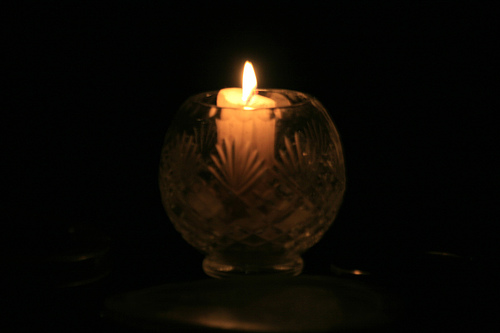
A candle against the dark night
(*photo
credit)
January 31, 2008 Support the Inspired
So often people are inspired to do good things, not just
inspired to execute a prank or do something dramatic for tv
coverage. Since inspiration is apparently spontaneous, many of us
are suspicious when someone is suddenly inspired to do something.
Where are the controls? Inspiration is easier to handle when it
involves a poem that only the mature will ponder, a novel that is
most likely fiction, a work of sculpture that will not bite, or a
score of music provided it is not too loud. Authentic inspiration
is often hard to detect and affirm. The fact is though we fail to
recognize that we are all inspired at different times in our lives-
- to say something meaningful to another, to follow a calling, to
choose a friend, to say a prayer, to visit someone, or to cook a
certain dish. Inspiration is part of being human, and winter is a
good time to reaffirm its role in our lives.
Prepare for inspiration through finding silent space. Part of
our freedom is to create an environment in which inspiration will
occur. Disorder and chaos are hardly the ways to proceed or to
expect authentic inspiration to express itself. Quiet time is
needed for becoming or continuing to be inspired. Though even in
very noisy circumstances some inspiration occurs, such is almost
miraculous and we cannot expect to operate on miracles. The normal
procedure is to go to the deserts of our lives, the far away places
where all distractions are removed and where the Spirit of God
moves. We can create quiet space in our hearts and this is done by
laying bear our souls before God and listening to the reply.
Inspiration most often involves others.
Recognize inspiration. Say "yes" to divinely inspired moments
of life. Let it be unreserved. We help make the inspiration
something radical or deep rooted so that it permeates our entire
being. Often our distractions make inspiration take a back seat or
fade. At least we ought to take notes, give thanks, allow for a
future time to act, and make the inspiration concrete in some
public manner.
Affirm inspiration in others. We often regard inspiration in
personal terms as though we alone are affected, but that is not the
case. Others are often cowed and do not admit to inspiration in
their lives, regard it with a certain fear, fail to make it public,
and through false humility ascribe inspiration to the great figures
of science, art or statesmanship. God has called us to live and
act in a privileged time, and we must feel comfortable being here
and dealing with our inspirations. When that comfort level grows,
we are more able to encourage others by admitting to them that they
are truly inspired and should follow the Spirit. So often it is
this shared recognition that allows the person to grow in self-
confidence. Saying "you can do it" is spreading the Good News.
Prayer: Lord, help us to stay inspired, for this can be the
Holy Spirit working in our lives. This is your gift that spices
our lives and gives us the "get up and go" to carry on. Thank you.